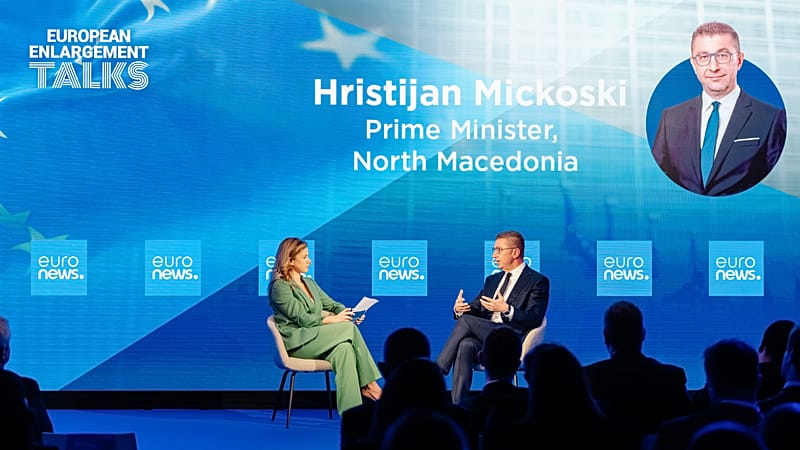North Macedonia ‘bullied’ on its EU membership path, PM Mickoski says

Despite being among the first of the Western Balkan countries to apply for European Union membership, North Macedonia has made little progress on its path to accession over the past two decades.
Hristijan Mickoski, the prime minister of North Macedonia, told Euronews that his country is “unfortunately in the same place where it was 25 years ago due to some artificial reasons”.
“Not because of the Copenhagen criteria, not because of fulfilling some objectives, but because of some artificial disputes, such as our national flag, our nation’s name, change of constitution this, change of constitution that,” Mickoski stated.
Here, he referred to the decades-long Greek veto that led to the country changing its name, as well as the ongoing Bulgarian veto on issues involving minority rights, history and language.
Athens believed the country’s name was only related to its northern region. In 2018, this central matter — the dispute over the name — was resolved by the Prespa Agreement. Skopje accepted the name North Macedonia, and Athens lifted its veto.
Meanwhile, Sofia’s veto related to its accusations that North Macedonia was disrespecting its shared cultural and historic ties to Bulgarians. Bulgaria has demanded constitutional and educational reforms as conditions for progress in Skopje’s EU accession talks
Mickoski called Sofia’s conditions for his country’s accession “political pressure and unfair treatment”.
“They are in, we are out, this is a bit of bullying … We would like to see ourselves at the table in Brussels and what is now the price and whether this is the last price that we should pay,” he stated.
The premier of North Macedonia also warned that the current approach undermines the EU’s founding principles and could happen to other membership hopefuls.
“If somebody dares to bully someone else who wants to join the club, why should the other be silent? This is not normal... probably this will occur in the future again and again because it works,” Mickoski said.
Mickoski called on Brussels to reflect on whether the unanimity rule and member state vetoes still align with “the principles and values” envisioned by Europe’s founders.
Changing constitutions
He questioned why the EU expects unilateral concessions from Skopje while turning a blind eye to the situation of Macedonians in Bulgaria.
“Why should we change our constitution then? Why are we not talking about the Macedonian community in Bulgaria? What about their human rights?” he asked. “They are not allowed to register a non-governmental organisation. We’re not talking [about a] change of the Bulgarian constitution. We’re talking about a sort of reciprocity.”
Mickoski argued that the imbalance undermines the EU’s own principles of fairness and equality between member states and candidate countries. But despite the tensions and delays, Mickoski reaffirmed that North Macedonia's joining the EU is a strategic choice.
“We do believe that our future is in the European Union. And we do believe that integration of Western Balkans in the EU means added value for the EU itself,” he said.
The prime minister said that ordinary Macedonians are growing disillusioned and confused by the lack of progress, questioning what the EU truly stands for today.
“Citizens of my country are full of frustration, are asking me, okay, Prime Minister, what is it now? If we do this, this will be the last one, or probably there will be some additional [ones] in the future?”
Yet, Mickoski insisted that the country continues to share the Union’s founding ideals. “Despite all those humiliations and disappointments and despite the current frustration which is inside of our citizens, we do share the same values,” he concluded.

